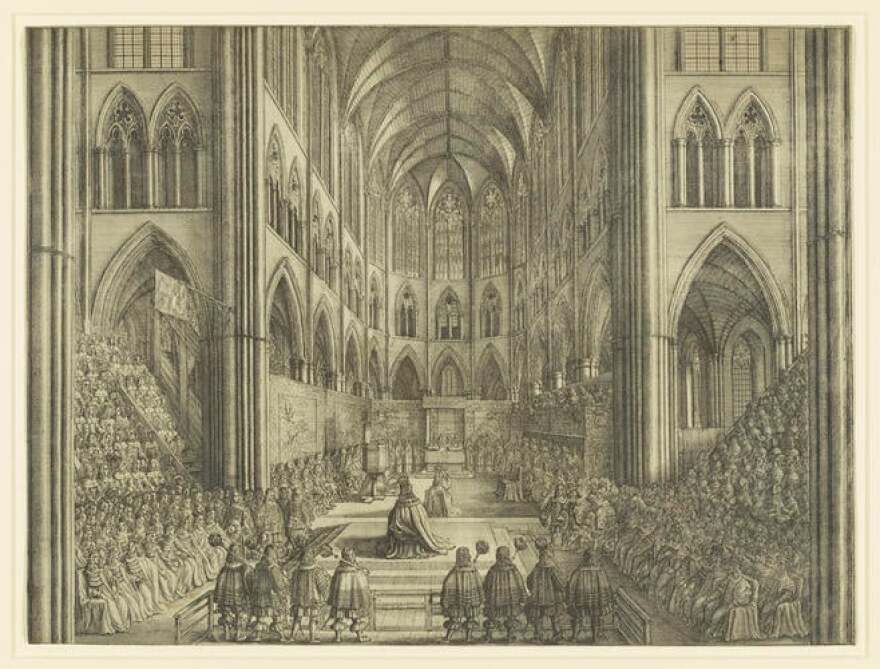On April 23, 1661, Charles II was crowned King of England in a ceremony of unparalleled fanfare. Presiding over the first coronation since the bloody devastation of the English Civil War, the dashing 30-year old monarch spared no expense in kicking off his reign with as much opulence as late 17th-century decorum would allow.

At the top of his party planner’s list: hiring an enormous band. The renowned diarist Samuel Pepys recalled the spectacular noise of the King processing to the throne heralded by a complement of 17 royal trumpets. He also noted his “great pleasure” at hearing 24 fiddlers bedecked in bright red uniforms, and the magnificent sound of choirs singing anthems by William Child and Henry Lawes.
In the 338 years since a man named Charles has been Britain’s sovereign, a great deal has changed about the nation’s identity and place in the world.
But when King Charles III walks down the same crowded aisle of Westminster Abbey during his ascension ceremony on Saturday, the esoteric yet magnificent tradition of coronation music will prove as strong as ever. Initial reports suggest that the soon-to-be King, a former cellist and longtime patron of the arts, has commissioned a dozen of his most musically gifted subjects to write compositions for his coronation festivities, which will include an anthem by Andrew Lloyd Webber; a march by the decorated Scottish film composer Patrick Doyle; and choral works by Paul Mealor (the first Welsh language music to be sung at a coronation), Roxanna Panufnik, and Judith Weir (currently the Master of the King’s Music).
As you catch up on Royal gossip and tend to your simmering coronation chicken, WRTI can help you get into a regal spirit with these essential works, which will be featured on the air between 8 a.m. and noon ET, on Saturday Morning Classics with Mike Bolton.
Handel: Zadok the Priest
Handel’s anthem Zadok the Priest was written for the 1727 coronation of King George II and has been performed as a prelude to the anointing portion of every coronation ceremony since. Its muted opening builds towards a resounding climax on the words “God Save the King!” — a defining pinnacle of the coronation ritual.
Beethoven: 7 Variations on “God Save the King,” WoO 78
Beethoven’s adaptation of the song that would become the national anthem of the United Kingdom stemmed from his prolific relationship with Scottish music publisher George Thomson, who commissioned Beethoven to make more than 150 arrangements of folk songs from around the British Isles. Beethoven throws the full force of his improvisatory genius and virtuosic pianism into the Variations, substantiating his claim to Thomson that he wanted “to show the English what a blessing they have” with the tune.
Elgar: Coronation Ode
Before it achieved worldwide fame for its association with graduation proceedings, the central melody of Edward Elgar’s First Pomp and Circumstance March played a key role in the 1902 coronation of King Edward VII. At the King’s suggestion, Elgar retrofitted words by A.C. Benson to his sweeping, lyrical line to create “The Land of Hope and Glory,” the concluding section of his Coronation Ode that has since become a patriotic emblem.
Walton: Crown Imperial and Orb and Sceptre
Sir William Walton composed marches for the last two coronation ceremonies: Crown Imperial for the 1937 crowning of Charles’s grandfather, King George VI, and Orb and Sceptre for the 1953 coronation of his mother, Queen Elizabeth II. Both marches, molded in the form of Elgar’s Pomp and Circumstance, are scored for enormous orchestras that capture the vigor and grandeur of the coronation spectacle.
Tippett: Suite in D (for the Birthday of Prince Charles)
Charles’s birth in 1948 occasioned the BBC to commission Sir Michael Tippett to compose this charming five-movement suite, first performed on a national radio broadcast by Sir Adrian Boult and the BBC Symphony Orchestra. It begins with a brief trumpet fanfare that gives way to a lilting lullaby, spirited march, reflective hymn, and ends with a blustery final dance.
Purcell: My Heart is Inditing
One of two anthems Henry Purcell composed for the 1685 coronation of James II, My heart is inditing employs a four-part string consort, eight vocal soloists, and an eight-part choir. Onlookers were wowed by the gargantuan size of the ensemble and many wrote awestruck remarks about its magisterial sound. For his efforts, Purcell received the then-handsome sum of £34.
Enjoy celebratory music for the Coronation between 8am and noon ET on Saturday, May 6 on WRTI-FM, as part of Saturday Morning Classics with Michael Bolton.


